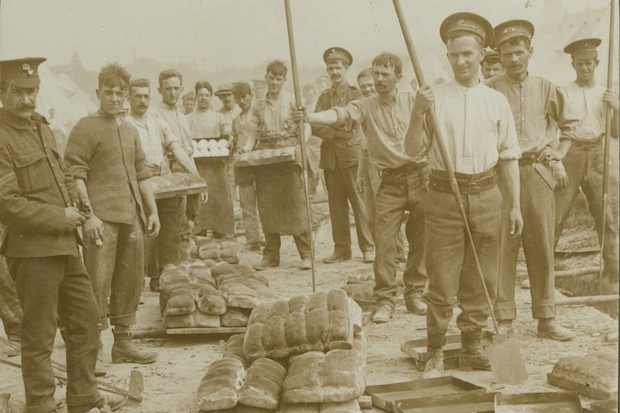From ‘Practical Proposals’, The Spectator, 6 February 1915:
“BUT, after all, something has got to be done about these high prices; what do you propose?” so will, we are sure, persist the practical man. Well, the appeal is not unnatural, and we will try to answer it in a practical spirit. We will attempt to outline what we should do if we were the Government—provided, of course, that we had come to the conclusion that the rise was not temporary, but, as far as we could see, a rise likely to last, and a rise which was causing acute suffering. In the first place, we should look very carefully into the problem of freights, and see whether there was a shortage of shipping. and so a physical incapacity to bring sufficient corn to Britain. If there was, we should at once take means for increasing the shipping engaged in the wheat trade. That more shipping could be obtained if necessary is evident. Take, for example, the ships which are now being used as prisons for German prisoners of war. If there really is a shortage in carrying vessels, it is a great pity that so many passenger steamers should be lying idle when hutments or tents would do just as well for these prisoners. They might even be taken across the seas in the ships in which they now are and interned in Canada or Newfoundland, or even in Australia and New Zealand. The ships could return with cargoes of wheat. We shall be told, we expect, that the passenger steamers now used for prison ships would not be ‘suitable for the carrying of grain. That is very likely true for peace time, but we venture to say that it is not true for war time. There is no reason why first-class passenger cabins and saloons should not be filled with flour-sacks, and also the steerage and intermediate accommodation, as well as the holds. There might be a little waste of space in not taking out the fittings of the ships, but probably that waste would be better than the delay caused in altering the ships to carry wheat or flour under more ship-shape conditions.
Next, we would if necessary have recourse to the plan we have proposed of a direct bounty, or, better, the fixing by the Government of a minimum below which the price would not go, in order to encourage growth and importation. Again, and this is a matter to which we attach no small importance, we should issue an appeal to the British people to do everything in their power to prevent waste in the consumption of all forms of foodstuffs, and especially bread. The nation just now, and not least its womenfolk, is most anxious to do anything it possibly can to help the good cause. If our housewives were told by the Government in plain terms that they could greatly assist by preventing the waste of bread, and that, though no one wanted to restrict the appetites of the people, it was essential that no bread should be thrown away, we believe there would be an instant response and very considerable improvement in our wasteful habits. At present the last thing any one troubles about is economy in bread. Finally, we would consider very carefully whether a certain part of the rise in price was not due to the inflation of our currency by the use of paper money. For ourselves, we by no means desire to make a positive statement that inflation is one of the causes of the rise in prices, but at any rate we think the matter quite worth the consideration of the Government. If it were determined to be an appreciable cause, an appropriate means of meeting this difficulty would have at once to be sought for.






Comments